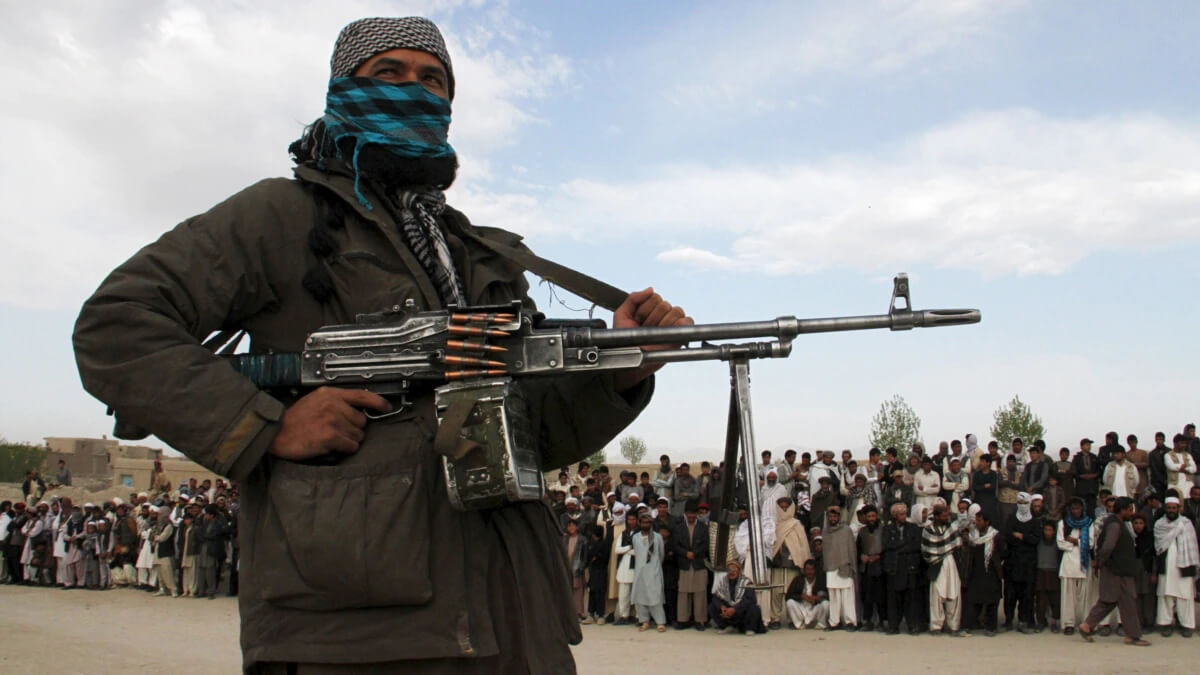This week, the Taliban publicly flogged 27 Afghans, including nine women, and held its first public execution since regaining control over Afghanistan in August 2021.
On Wednesday in Farah, it publicly executed a convicted murderer, which the group said was an example of qisas, which means an “eye-for-an-eye punishment.”
The convict was shot three times by the victim’s father for stabbing the victim to death in 2017. The victim’s family had earlier rejected several requests to forgive the man and wanted the punishment to be death as a “lesson” for others.
The following day, the Supreme Court stated that 27 “criminals” were flogged in Charikar, including nine women who were punished for “moral crimes,” including drug offences, sodomy, deception, escaping from home, illegal relationships, homosexual sex, and forgery.
The court said, “Each of these criminals confessed their crimes before the court without any force and was satisfied with the punishment.”
In addition to the flogging, authorities awarded two-year prison sentences to an unspecified number.
AFP quoted a witness saying that over 1,000 officials and residents watched the floggings in a stadium while chanting “Allahu Akbar” and “we want the law of God to be implemented on our soil.” The criminals received 20 to 39 blows, each with a “metre long and four fingers wide” cane.
#Afghanistan first public execution is deeply disturbing. We urge the de facto authorities to establish an immediate moratorium on any further executions, and act swiftly to prohibit use of the death penalty in its entirety: https://t.co/vi4bztRjVj pic.twitter.com/Cu3Yqpsyr4
— UN Human Rights (@UNHumanRights) December 8, 2022
While Wednesday’s incident was the first public execution, this is the second time just this month that the Taliban conducted a public flogging. Last month 19 people were flogged in Takhar with 39 lashes each.
Public punishments have grown popular under the Taliban regime after its Supreme Leader, Hibatullah Akhundzada, issued an order last month to enforce strict Sharia law, including punishments such as amputations, flogging, and public executions.
United States (US) State Department spokesperson Ned Price criticised the latest public flogging on Wednesday, saying, “This indicates to us that the Taliban seek a return to their regressive and abusive practices of the 1990s.”
Price reiterated that the revival of relations with Afghanistan remains contingent on the Taliban’s “actions when it comes to human rights” and stressed in this regard that the group has “failed to uphold its promises.”
He added, “It was an affront to the dignity and the human rights of all Afghans then; it would be an affront to the dignity and the human rights of all Afghans now.”
US special Afghan representative Thomas West also raised the issue during a meeting with Taliban Defence Minister Mulawi Mohammed Yaqub in Abu Dhabi on Wednesday, lamenting the “deteriorating human right situation”, particularly for women.
Similarly, United Nations Secretary-General António Guterres expressed “deep concern.” Spokesperson Stephanie Tremblay said the Secretary-General insists that “the death penalty cannot be reconciled with full respect for the right to life.”
2/4 I called on the Taliban to respect women & girls’ rights to be educated & to work so that they can support their families.
— U.S. Special Representative Thomas West (@US4AfghanPeace) December 7, 2022
Likewise, Office of the United Nations High Commissioner for Human Rights (OHCHR) spokesperson Jeremy Laurence emphasised that death penalties are “incompatible with the fundamental tenets of human rights.”
The United Nations Assistance Mission in Afghanistan, too, called on the Taliban to abolish the death penalty.
Taliban spokesperson Zabihullah Mujahid, however, rejected the “reprehensible interference” in Afghanistan’s internal affairs.
Mujahid said the critics “don't have respect for the beliefs, laws, and internal issues of the Muslims” or “proper knowledge and understanding of Afghanistan,” adding, “[Afghans] have rendered many sacrifices for the enforcement of Islamic laws and system in the country.”
Mujahid further said that the punishments were awarded after three courts had confirmed the convictions, which Akhundzada then approved. In addition, he remarked that several other countries, including the US and European nations, also practise capital punishment.
However, experts believe that such public punishments have rarely been executed under Islamic law, as most jurists have interpreted Sharia law differently.
#Afghanistan’s de facto authorities announced the public execution of a man in Farah province today.
— UNAMA News (@UNAMAnews) December 7, 2022
The UN strongly opposes the death penalty in all circumstances, and calls on de facto authorities to establish immediate moratorium with a view to abolishing the death penalty.
Despite promising that it would not introduce repressive policies that characterised its rule in the 1990s, the Taliban has gone back on its word and introduced several attacks on human rights and women’s rights.
Over the past few months, Afghan women have been barred from travelling long distances without a male chaperone, restricted from schools and colleges, barred from workplaces, banned from obtaining driving licenses, and ordered to cover their faces from head to toe in public spaces. It has also eliminated the Ministry of Women and replaced it with the Ministry of Vice and Virtue.
In November, the Taliban also announced a ban on women’s entry into parks and gyms.
Citing concerns over the continued hard-line policies, no country has formally established relations with the Taliban.
Nevertheless, there is a significant part of the Taliban leadership that wants to refrain from introducing blatantly radical rules to revive foreign funding and prevent further economic deterioration.

